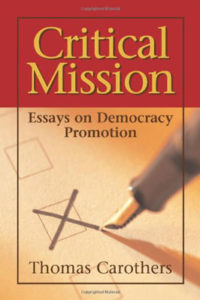 Max Boot (“What the Neocons Got Wrong,” March 10) deserves praise for some serious soul-searching, the Carnegie Endowment’s Thomas Carothers observes. Yet in renouncing his prior belief in military-led regime change, he commits the basic error of viewing efforts to support democracy as a purely idealistic endeavor, divorced from U.S. security interests.
Max Boot (“What the Neocons Got Wrong,” March 10) deserves praise for some serious soul-searching, the Carnegie Endowment’s Thomas Carothers observes. Yet in renouncing his prior belief in military-led regime change, he commits the basic error of viewing efforts to support democracy as a purely idealistic endeavor, divorced from U.S. security interests.
Leaving aside the fact that the United States has not in recent memory exhibited much shame in prioritizing its interests globally, the problem with this formulation is that the strength of an ally’s democracy is often connected with U.S. security interests, he writes for Foreign Affairs:
Boot’s account falls short. He presents a stark choice between doing too much (forcible regime change) or too little (criticizing human rights abuses). There are many other options for supporting democracy. Washington can use economic carrots and sticks alongside bilateral and multilateral diplomatic engagement. It can underwrite targeted political assistance programs, which bolster key democratic institutions and processes, including electoral management bodies and judicial systems.
Boot is to be commended for his effort to renounce military-oriented democratic maximalism, Carothers adds. But he retreats too far into putatively rigorous realism, overlooking the crucial fact that democracy and security are often inextricably interconnected.
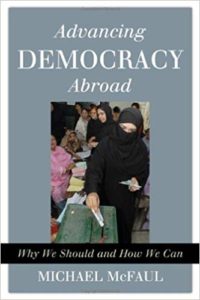 The McCain Institute’s Tom Malinowski concurs.
The McCain Institute’s Tom Malinowski concurs.
When I served as U.S. President Barack Obama’s Assistant Secretary of State for Human Rights, the commander of U.S. Pacific Forces, Admiral Harry Harris, told me that from his standpoint, China’s threats to Taiwan, incursions in the South China Sea, and repression in Hong Kong and Xinjiang were “the same issue,” he writes in the exchange:
He meant that China, like Russia, was trying to undermine the global norms that favor the democratic, rule-of-law-respecting powers and constrain the freedom of action of the authoritarian powers. “Whenever we’re strong on human rights,” Harris told me, “it helps me on my issues.” I replied that “whenever we’re strong on the South China Sea or trade, it helps me on mine.” The tired distinction between “values” and “interests” in U.S. foreign policy is absolutely meaningless in the competition with China, as it is in Ukraine.
A foreign policy true to U.S. ideals aligns Washington with people everywhere who share them, demonstrates confidence, distinguishes the United States from its adversaries, lends legitimacy to its use of power, and helps its leaders maintain domestic support, Malinowski asserts.
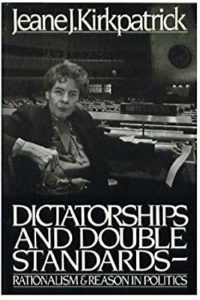 I did not try to lay out a formula for balancing interests and ideals in U.S. foreign policy, because I acknowledge both to be important, says Boot, the Jeane J. Kirkpatrick Senior Fellow in National Security Studies at the Council on Foreign Relations. My only point, really, was that Americans should not be so blinded by fantasies of exporting democracy—whether by military force, covert operations, or sanctions—that they exaggerate their ability to determine the internal politics of foreign countries or that they do damage to their ability to protect their national security.
I did not try to lay out a formula for balancing interests and ideals in U.S. foreign policy, because I acknowledge both to be important, says Boot, the Jeane J. Kirkpatrick Senior Fellow in National Security Studies at the Council on Foreign Relations. My only point, really, was that Americans should not be so blinded by fantasies of exporting democracy—whether by military force, covert operations, or sanctions—that they exaggerate their ability to determine the internal politics of foreign countries or that they do damage to their ability to protect their national security.
As both Carothers and Malinowski point out, there are many ways that the United States can and should promote democracy and human rights “with humility and restraint,” he adds. On that, we can agree. RTWT
On a broader canvas, can the West win over the rest?
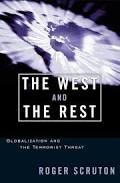 At first glance, today’s 100-plus ostensibly neutral countries still face many of the same problems as the non-aligned movement did in the 20th century. They have too little in common to be as cohesive as the West, or even the Sino-Russian alliance of convenience: huge democracies such as Brazil and India have few shared interests, let alone a common agenda with a cash-rich monarchy like Qatar, The Economist asks. Yet it is a mistake to underestimate their role, for two reasons:
At first glance, today’s 100-plus ostensibly neutral countries still face many of the same problems as the non-aligned movement did in the 20th century. They have too little in common to be as cohesive as the West, or even the Sino-Russian alliance of convenience: huge democracies such as Brazil and India have few shared interests, let alone a common agenda with a cash-rich monarchy like Qatar, The Economist asks. Yet it is a mistake to underestimate their role, for two reasons:
- First, their economic clout is rising. Consider the 25 largest non-aligned economies, or the “transactional-25” (defined as those which have not imposed sanctions on Russia, or have said they wish to be neutral in the Sino-American contest). Together they account for 45% of the world’s population and their share of global GDP has risen from 11% when the Berlin Wall fell to 18% today, more than the EU. After decades of free-wheeling globalisation, their combined trade pattern is multipolar, with a three-way split between the West, China and other non-aligned states.
- Second, their approach to the world, shaped by their desire for national development, has become ruthlessly pragmatic. They have turned into globalisation’s most unlikely defenders: from Mexico to Indonesia, they want to trade freely with both sides of the geopolitical divide, while also seizing on the opportunities to profit as supply chains are restructured away from an excessive reliance on China. Pragmatism also means they have limited confidence in the institutions of the post-1945 American-led order such as the UN or IMF, which they see as being in a state of disorder and decay. Western appeals to defend the liberal order or human rights are often seen as being self-serving, inconsistent and hypocritical. RTWT
On the subject of democracy assistance…..
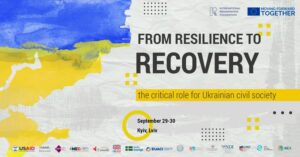
Credit: NDI
Ensuring Accountability for International Technical and Financial Assistance to Ukraine
The Atlantic Council’s Eurasia Center and the National Democratic Institute host an in-person discussion with representatives of the “Temporary Special Commission of the Verkhovna Rada of Ukraine on Monitoring the Receipt and Use of International Material and Technical Assistance during Martial Law.” The conversation will center on parliament’s oversight functions, as well as Ukraine’s anti-corruption strategy.
Speakers
MP Davyd Arakhamia – Majority Leader, Servant of the People faction; Member of the Committee on National Security, Defense and Intelligence
MP Yehor Cherniev – Deputy Chairman of the Committee on National Security, Defense and Intelligence
MP Oleksandra Ustinova – Head of the Temporary Special Commission of the Verkhovna Rada of Ukraine on Monitoring the Receipt and Use of International Material and Technical Assistance during Martial Law.
Monday, April 17, 2023. 2:00 pm – 3:30 pm. National Democratic Institute, 455 Massachusetts Avenue NW, Washington, DC 20001 Register HERE.
More than half of the world’s population live in over 100 countries that do not want to pick sides in the great geopolitical divide. As China and the West vie for influence, who will prevail? https://t.co/Z2VtvhYJjE
— The Economist (@TheEconomist) April 13, 2023







